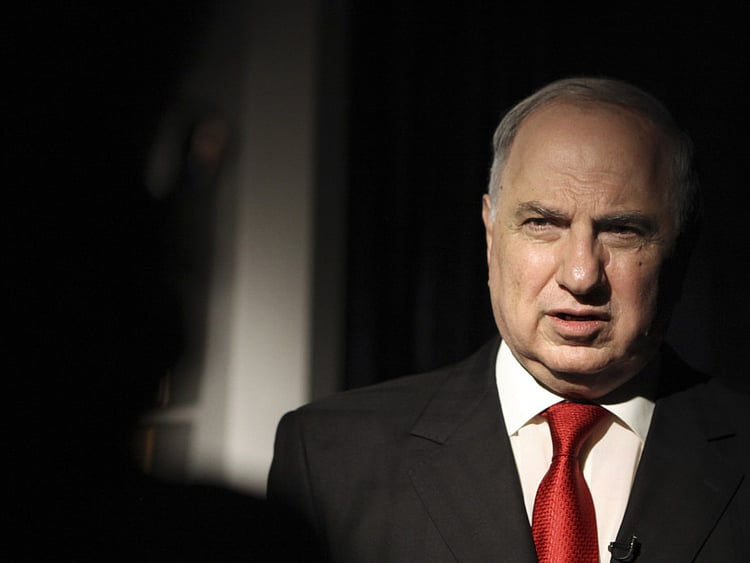Arbil, Iraq: Ahmad Chalabi, a well-connected Iraqi exile whose false claims about Saddam Hussain’s arsenal helped spur the US-led invasion in 2003, has died of a heart attack, Iraqi state media said on Tuesday.
He was found dead in his home in the Iraqi capital Baghdad on Tuesday, according to Ali Yaseen, his driver. Chalabi was 71.
Chalabi’s political fortunes rode on the coat tails of a war — and the years of bloodshed and unrest that followed — that many claim he helped spark.
Chalabi became synonymous with the spotty — and sometimes wrong — intelligence used to bolster assertions by President George W. Bush and others that the Iraqi leader possessed weapons of mass destruction.
Chalabi, who had lived outside Iraq since the 1950s, was central in pedalling bogus information about Hussain’s weapons capabilities and linking him to Al Qaida.
In the years before the invasion, Chalabi’s Iraqi National Congress fed Washington a stream of claims and worrisome scenarios about Saddam’s regime, including details from an alleged Iraqi defector, famously code-named “Curveball”, that was added to classified dossiers used by military planners in the United States and Britain.
After years in exile in the United States and Britain, Chalabi returned to Iraq after Saddam’s fall, becoming interim oil minister.
But he was later dogged by allegations of corruption and lacked popular support. Still, he managed to remain a prominent figure on Iraq’s political scene, often touted as a candidate for the premiership.
“He will use whatever vehicle or platform that presents itself to further his own agenda,” Ryan C. Crocker, US ambassador to Iraq from 2007 to 2009, told The Washington Post as Chalabi campaigned in the 2010 elections.
When former prime minister Nouri Al Maliki was ousted in 2014, Chalabi once again attempted to make a comeback, positioning himself as a consensus candidate.
In an interview in his home in the Hurriya neighbourhood of Baghdad last month, a family farm surrounded by palm groves, he appeared frail and claimed to no longer have his sights on leadership. He painted a bleak picture of the future of the country.
“Iraq is a mess. Daesh is organised, with one command, united and well run, and we are so fragmented,” he said. “We have no discipline, no command structure, no effective plans.”
In the wake of the invasion, Chalabi was among the key Iraqis promoting the so-called “de-Baathification” process, a policy that attempted to remove figures from Hussain’s Baath Party from Iraq’s new political system. Critics said it help to drive division in the country, which spiralled into sectarian war.
“We undermine any Sunni leadership that emerges, we try to make them less credible,” Chalabi said, in an apparent admission of past mistakes. He said Shiite parties are still “bent on revenge” after years of suppression under Saddam, who hailed from Iraq’s Sunni community.
From a wealthy Shiite merchant family, Chalabi left the country in 1956 and spent most of his life abroad.
He earned a doctorate in mathematics from the University of Chicago before turning his hand to banking. In the 1970s, the Jordanian government accused him of bank fraud after the failure of Petra Bank, which he set up.
He fled the country and was convicted in absentia with Jordan ordering the return of $30 million (Dh110.19 million) in embezzled funds. He has maintained that the case was politically motivated, the result an attempt by the Iraqi government to attack him.
A close associate of the Bush administration neoconservatives, he was flown back to Iraq soon after the invasion — viewed as a potential new leader. But corruption allegations re-emerged.
In 2004, US troops raided his Iraqi home and office in relations to allegations of fraud and kidnapping. His relationship with the US appeared to sour. A wily operator, he always managed to bounce back.
He performed badly in the country’s 2005 elections, after a campaign with posters that proclaimed “We liberated Iraq” and was appointed oil minister. “A handful of people have made billions,” he said of Iraqi graft during last month’s interview. “Corruption has been rampant for eight years but no one said anything because there was money, now there’s no money.”
Sign up for the Daily Briefing
Get the latest news and updates straight to your inbox
Network Links
GN StoreDownload our app
© Al Nisr Publishing LLC 2026. All rights reserved.
